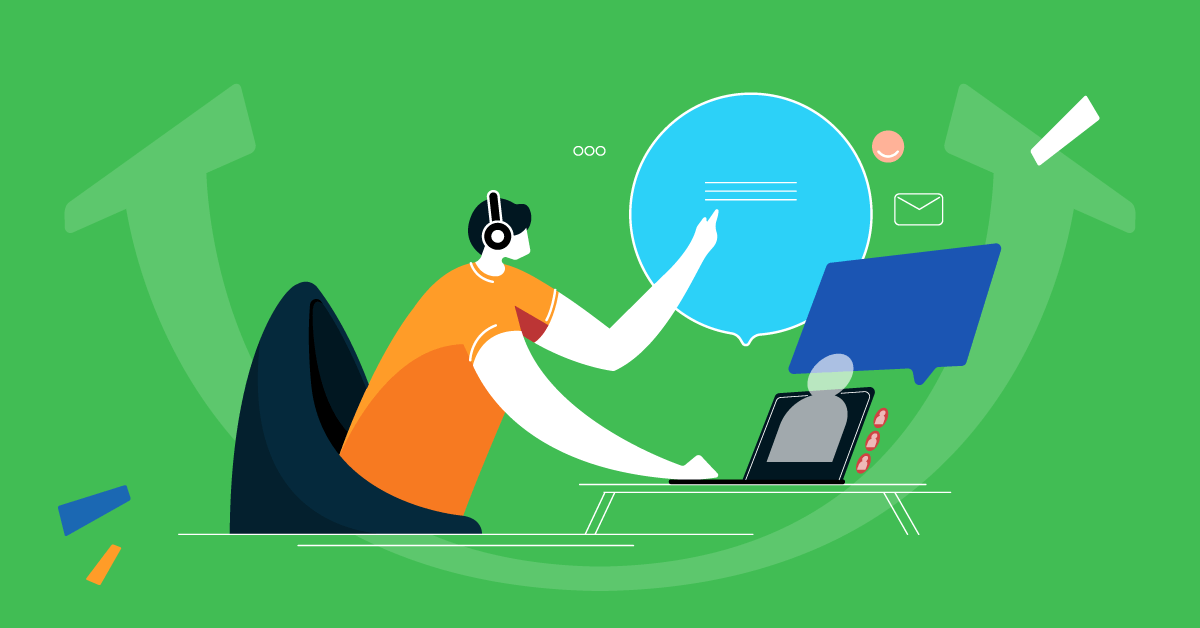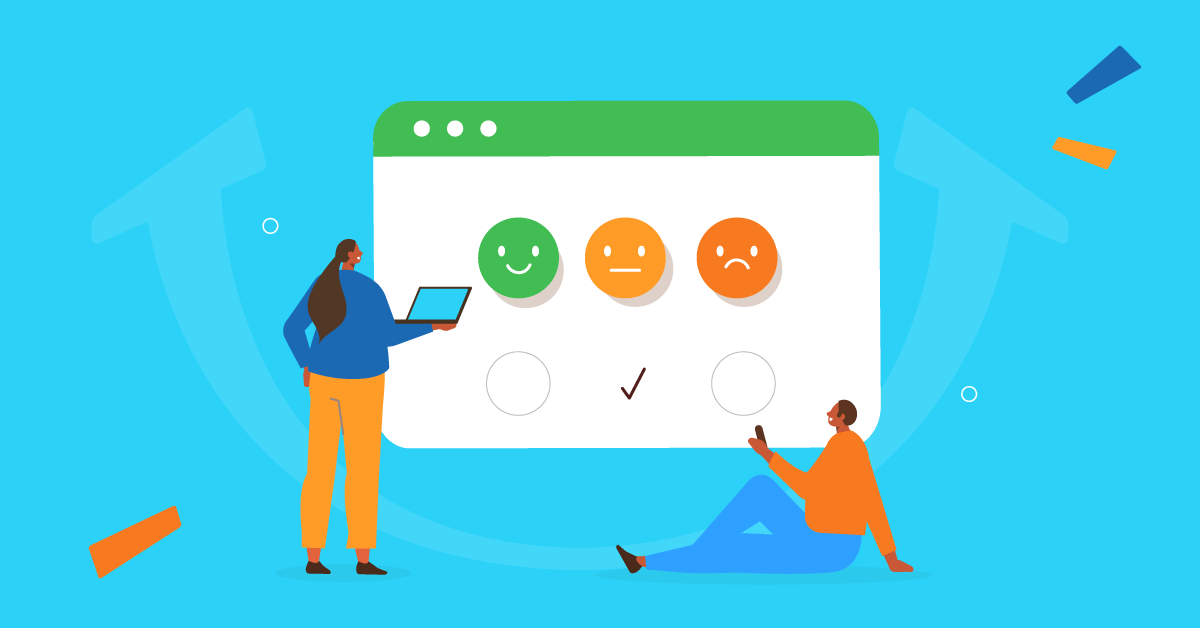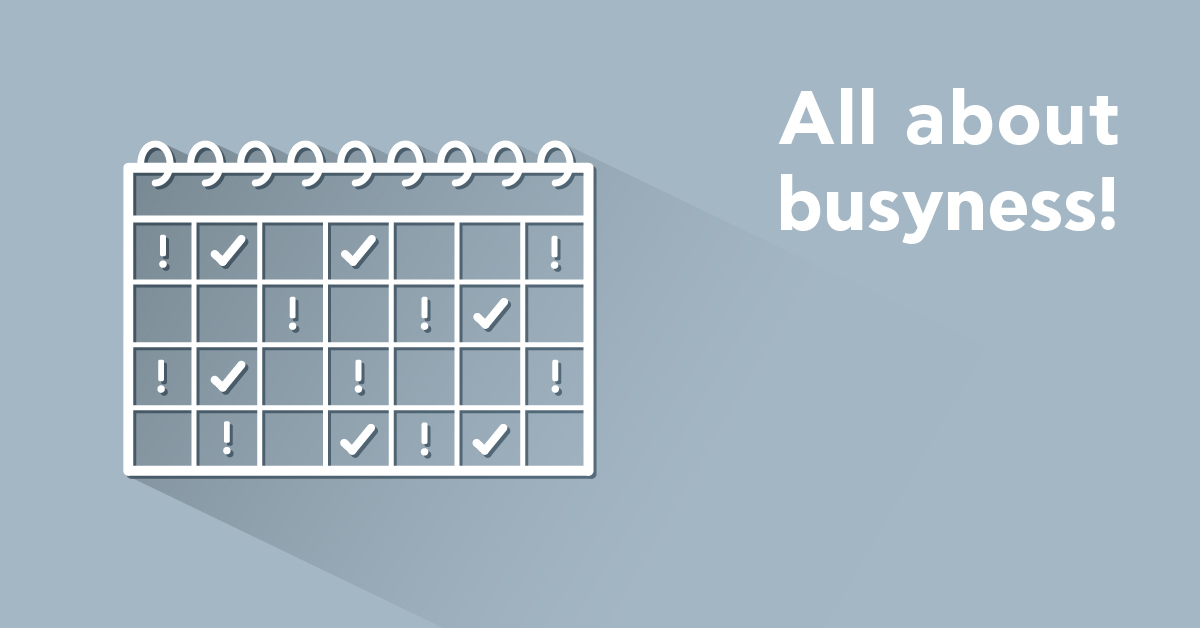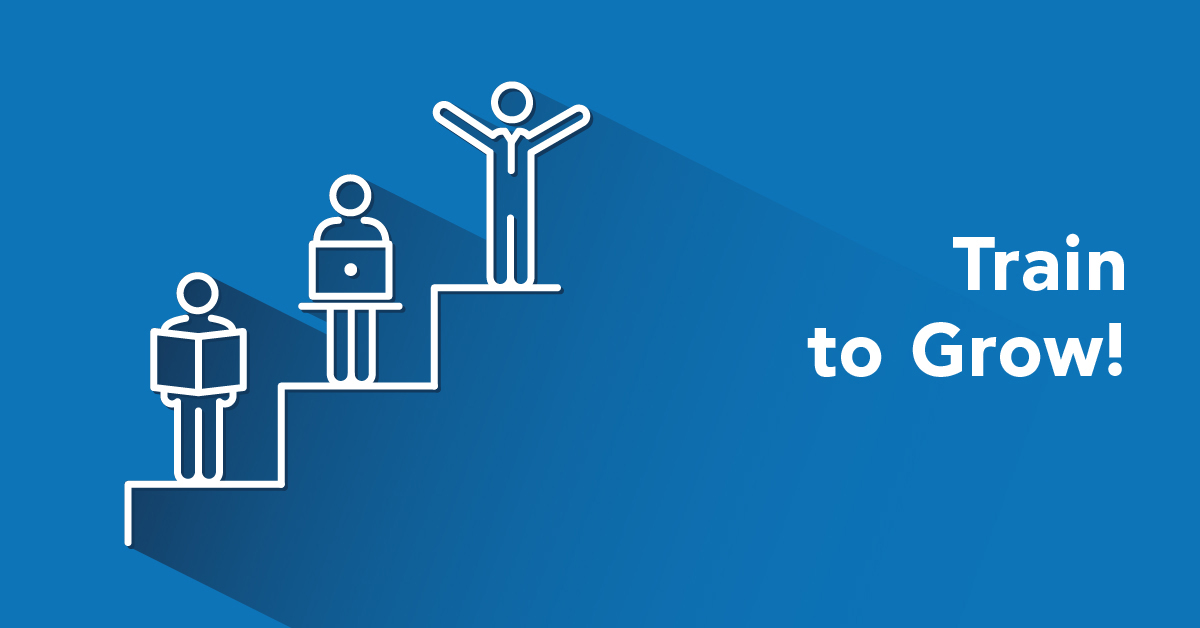Customer education is at the heart of what makes modern businesses succeed. Do you help your customers get the most out of your product or service? Then it’s a win-win. You boost customer satisfaction, build loyalty, plus keep your brand top of mind for all the right reasons. Also, happy customers stick around longer and make sure to spread the word about you.
In this article, we’ll break down everything you need to know about customer education. What it is, why it matters, how to get it up and running, and the tools to successfully educate customers. Let’s dig in.
What is customer education?
Customer education is all about empowering your customers to get the most out of your product or service.
It’s about creating a learning journey that builds their confidence and helps them see value faster. A successful customer education program includes a mix of resources. For example, interactive user guides, video tutorials, webinars, and LMSs. These support a seamless and engaging learning experience.
By making learning accessible and practical in your customer education program, you can increase customer engagement, improve product adoption, and turn your customers into loyal brand advocates. The goal? To give your customers the tools and knowledge they need to succeed—and love doing it.
Who is customer education for?
Customer education is designed to empower anyone who interacts with your product or service, helping them unlock its full value. Here’s a closer look at who benefits—and why it matters:
New customers
A seamless onboarding experience helps new clients hit the ground running and easily adopt your product or service. By offering guided tutorials, onboarding checklists, and interactive LMS courses, you reduce friction and build confidence from day one. Which makes it easier for them to see immediate value through your customer education program.
Existing customers
Long-time users need ongoing support to stay up-to-date with new features, product updates, and advanced use cases. Continuous learning through webinars, FAQs, and deep-dive videos keeps them engaged. Plus it strengthens loyalty and improves customer satisfaction scores, leading to higher retention and potential upsells.
Enterprise clients
Larger accounts often have complex workflows that require tailored support. Custom learning paths, specialized training, and dedicated customer success resources ensure these high-value clients receive personalized solutions that fit their needs.
Partners and resellers
Your partners and resellers are extensions of your brand. Equipping them with detailed product knowledge training and sales strategies through certification programs, playbooks, and co-branded training materials ensures they confidently represent your offerings and provide exceptional service.
Support teams
Your support and service departments must be product experts to provide fast, accurate, and empathetic assistance. Internal training modules, knowledge base refreshers, and role-playing scenarios help them resolve issues efficiently and build stronger customer relationships.
Prospective customers
Customer education can begin before the sale. By offering product or service demos, how-to videos, and interactive guides, you help prospects see how your solution meets their needs and build the confidence to make a purchase decision.
Why is customer education important?
You might think customer education is just about teaching people how to use the product. On the contrary, it’s about building long-term relationships with clients, boosting customer confidence, and creating positive experiences. Whether you’re in SaaS, retail, or professional services, an effective customer education program sets your brand apart.
How? It makes your customers feel supported every step of the way.
Here’s a deeper dive into the key benefits of customer education and why it’s a must-have:
Improves customer satisfaction and engagement
Think of customer education as a way to provide your users with an effortless solution, like handing them the “easy button.”
When customers know how to make the most of your product, they’re not just users—they become engaged, confident advocates. Clear, accessible resources help eliminate guesswork and give customers a smoother experience, leading to higher satisfaction. Engaged customers interact more, provide feedback, and are more likely to build a lasting relationship with your brand.
Boosts customer retention
Frustration is one of the biggest drivers of churn.
An educated customer base is less likely to abandon your product because they have the tools to overcome challenges and uncover new ways to solve problems. When customers trust that your product supports their needs and your resources have their back, they’ll stick around—and stay loyal.
Lowers support costs
Let’s face it: support tickets can pile up fast.
But with well-structured learning resources like LMS courses, help centers, and tutorials, customers can solve many issues independently. This reduces the demand on your support department, freeing them up to handle more complex cases. Your customers get quicker answers, and your team can work more efficiently.
Strengthens brand loyalty
People remember how your product made them feel, and customer education plays a big part in that.
When customers feel empowered and informed, they associate that confidence with your brand. This strengthens loyalty and turns customers into brand advocates who spread the word to their networks. The more value they get from your product, the more your brand becomes part of their success story.
Increases upselling and cross-selling opportunities
A knowledgeable customer is more open to exploring additional features, upgrades, or complementary services.
When customers understand how your product can support their evolving needs, it’s easier for them to see the value of premium options or expanded solutions. Instead of a sales push, it feels like a natural next step in their journey.
Shortens onboarding time
Nothing builds momentum like quick wins.
A well-designed customer education program helps customers get up to speed faster and reach those “aha” moments sooner. Whether it’s their first time using the product or they’re rolling out new features to their team, education helps smooth the transition and reduce onboarding friction—so they can hit the ground running.
Positions your brand as a trusted expert
When your customer education efforts go beyond the basics, you’re building credibility.
Sharing expert tips, industry insights, and helpful resources elevates your brand’s reputation as a go-to source for valuable knowledge. Customers will trust not only your product, but also your expertise, making your brand stand out in a crowded market.

How to create a successful customer education program
Creating a winning customer education program doesn’t happen by accident. It takes thoughtful planning and smart execution. Here’s your go-to guide for success:
1. Define your learning objectives
Let’s start with the basics: why are you building this customer education program? Whether you’re looking to reduce churn, boost product adoption, or drive upsells, your learning objectives will define your customer training strategy.
Make sure your goals are specific and measurable in your customer education program. For example, if you want to increase feature adoption, set a target like “increase feature X usage by 20% over the next quarter.”
Align your objectives with broader business goals. Like improving customer satisfaction scores or cutting support costs. Collaborate with teams across sales, customer support, and marketing to understand where customer education can have the biggest impact. You’ll ensure your customer education efforts drive meaningful results by grounding your program in strategic business goals.
2. Understand your audience
Customer education programs aren’t one-size-fits-all. To make your content resonate, you need to know your learners. Who are they? What’s their experience level with your product or service? What challenges are they facing?
Gather audience insights by:
- Sending surveys to identify customer learning preferences.
- Conducting interviews to understand deeper pain points.
- Analyzing support tickets to see common issues that could be addressed through training.
- Tracking product usage data to pinpoint features where customers get stuck.
Don’t forget to segment your audience by skill level, role, or product usage stage. This will help you serve up customer education content that’s both relevant and timely.
Pro tip: Map out key moments in the customer journey—like onboarding, product updates, and renewals—so you can deliver targeted training at the right time.
3. Design engaging training content
Nobody wants dry, forgettable customer education training.
To create standout client training programs, aim for content that’s engaging, easy to digest, and actionable. A mix of formats will help you cater to different learning styles:
- Videos: Perfect for showing off product features in a visual way. Keep them short and add captions for accessibility.
- Webinars: Great for live Q&A sessions and interactive customer education learning. Record them for on-demand access.
- Infographics: A creative way to break down complex workflows or data.
- Guided simulations: Let customers practice real-world scenarios in a safe, hands-on environment.
- Quizzes and assessments: Reinforce learning and check retention with interactive quizzes. Add feedback to help learners improve.
Pro tip: Incorporate real-life case studies and interactive tutorials that show how other customers have succeeded. Downloadable checklists and resource guides can also keep your training top of mind.
4. Use a customer education LMS
A solid customer education LMS is the backbone of your program. It helps centralize your content, track learner progress, and offer personalized learning paths.
When choosing the right SaaS LMS for your customer training strategy, consider:
- Integration capabilities: Does it connect with your CRM or support tools for a seamless experience?
- Scalability: Can it grow with your expanding customer base?
- Analytics features: Does it offer reports on course completion rates, learner engagement, and more to help you improve?
- Customization options: Can you brand it to create a cohesive experience?
Pro tip: Look for features like learner tracking and multilingual support to fine-tune your product and customer education strategy and make it globally accessible.
5. Promote your program
Even the best customer training programs can flop if no one knows about them. Build excitement and drive engagement with a multichannel approach:
- Email campaigns: Send targeted invitations and reminders.
- In-product pop-ups: Notify users about relevant training while they’re using your product.
- Social media: Share tips, webinars, and success stories to spark interest.
- User communities: Post resources and start conversations in customer forums.
- Customer success calls: Encourage your success team to highlight training benefits during their check-ins.
Pro tip: Audience segmentation is key—different groups will need different messaging. And don’t underestimate timing! Promote customer education training during pivotal moments like onboarding or right after a product update. Collaborating with industry experts and power users can also amplify your reach.
6. Measure success
How do you know if your customer education program is working? It’s all about tracking Key Performance Indicators (KPIs) and gathering feedback. Metrics to monitor include:
- Course engagement rates: How long are learners spending on content?
- Knowledge retention scores: Are they acing quizzes and assessments?
- NPS or CSAT ratings: How satisfied are learners after training?
- Support ticket reduction: Are support requests decreasing for topics covered in training?
- Feature adoption: Are customers using your product’s key features more effectively?
7. Collect and act on feedback
Collecting feedback is essential to understand what’s working and where there’s room for improvement in your customer education program. Go beyond the numbers and focus on qualitative insights that reveal the learner experience.
- Open-ended surveys: Ask learners what they found helpful and what could be improved.
- Focus groups: Organize discussions with a sample of users to gather in-depth feedback.
- Direct feedback: Encourage users to share their thoughts after completing key courses.
- Usability testing: Observe learners interacting with your customer education LMS to identify pain points and opportunities.
Once you’ve gathered this data, prioritize actionable takeaways and implement changes. Regularly update your training based on user input, product updates, and evolving customer needs to keep your program fresh, valuable, and impactful.
Customer education tools you shouldn’t miss
To build an effective customer training program, having the right tools makes all the difference. Be it for onboarding new users or helping seasoned customers master your product, here are the tools you need to succeed:
Learning Management System
Think of your LMS as your customer education HQ. It’s a place to host, deliver, and track your training courses. From onboarding tutorials to advanced product certifications, your LMS ensures customers have consistent access to learning when they need it.
- Key benefits: Centralized training hub, progress tracking, and interactive learning tools.
- Pro tip: Choose a platform that integrates with your CRM and support tools for a seamless experience in your customer education strategy.
Support guides (documentation & knowledge base)
Self-service support is necessary to keep customers informed and independent. A well-structured knowledge base provides step-by-step instructions, FAQs, and troubleshooting resources.
- Key benefits: Quick answers, reduced support requests, and searchable content
- Pro tip: Include screenshots, GIFs, and short videos to make content more engaging
Product walk-throughs and demos
Show, don’t just tell. Product walk-throughs and demos guide customers through workflows and highlight key features in action. These can be live webinars, pre-recorded tutorials, or interactive sessions for customer education.
- Key benefits: Personalized learning and better feature adoption.
- Pro tip: Keep demos focused on solving real customer pain points to boost engagement.
Customer support
Even the best self-service resources can’t cover everything. Human support is crucial for handling complex or unique questions.
- Key benefits: Personalized help and faster resolution for advanced issues.
- Pro tip: Pair customer support teams with your customer education LMS to create a seamless support-to-training flow.
Community discussions
Let your customers learn from each other. Community forums create a space for peer-to-peer learning, where users can share tips, ask questions, and showcase their expertise.
- Key benefits: Builds a sense of community and reduces support requests.
- Pro tip: Encourage customer education engagement by featuring top contributors and pinning helpful answers.
Certifications and badges
Everyone loves recognition. Offering certifications or badges for completing training milestones boosts motivation and positions your product as an industry leader.
- Key benefits: Increases course completion rates and reinforces brand loyalty.
- Pro tip: Add social sharing options, so customers can proudly display their achievements.
Webinars and Q&As
Live events keep things interactive and give customers direct access to product experts. Whether you’re covering feature updates or answering FAQs, webinars, and Q&As keep customers engaged.
- Key benefits: Real-time interaction and the chance to clarify common questions.
- Pro tip: Record your sessions and add them to your LMS for on-demand access.
How to choose the right customer education LMS
When it comes to customer training programs, finding the perfect customer education LMS can feel like finding a needle in a haystack.
There are many options, but the right LMS can make or break your customer education strategy. Here’s what to look for to make your search easy—and effective.
Let’s examine the key features that will transform your customer education programs from “meh” to “magnificent.”
AI features
AI features automate and personalize the learning experience. Look for features like AI course content generation. These tools tailor training to specific needs, plus boost engagement and outcomes.

Engagement tools
If your customer training strategy doesn’t include engagement features, you’re missing out. Elements like points, badges, and leaderboards help make learning rewarding. Gamification isn’t just fun—it boosts customer retention and keeps new and existing customers coming back for more.
Customization options for tailored learning
One-size-fits-all customer education training? Your customer education software should let you design custom learning paths and courses that fit your audience’s needs. Whether you’re onboarding new users or teaching advanced product features, interactive modules, quizzes, and multimedia should be easy to incorporate.
Personalized learning isn’t just a trend. It’s necessary to keep improving customer education and fostering long-term engagement.
Skill development
A solid LMS supports skill-based learning. This means you can map out essential skills and track learner progress in real time, ensuring your customers gain the knowledge they need to excel.
Think of it like this: Instead of hoping your customers “get it,” you’ll know they’ve mastered the skills that matter with the help of Skills.
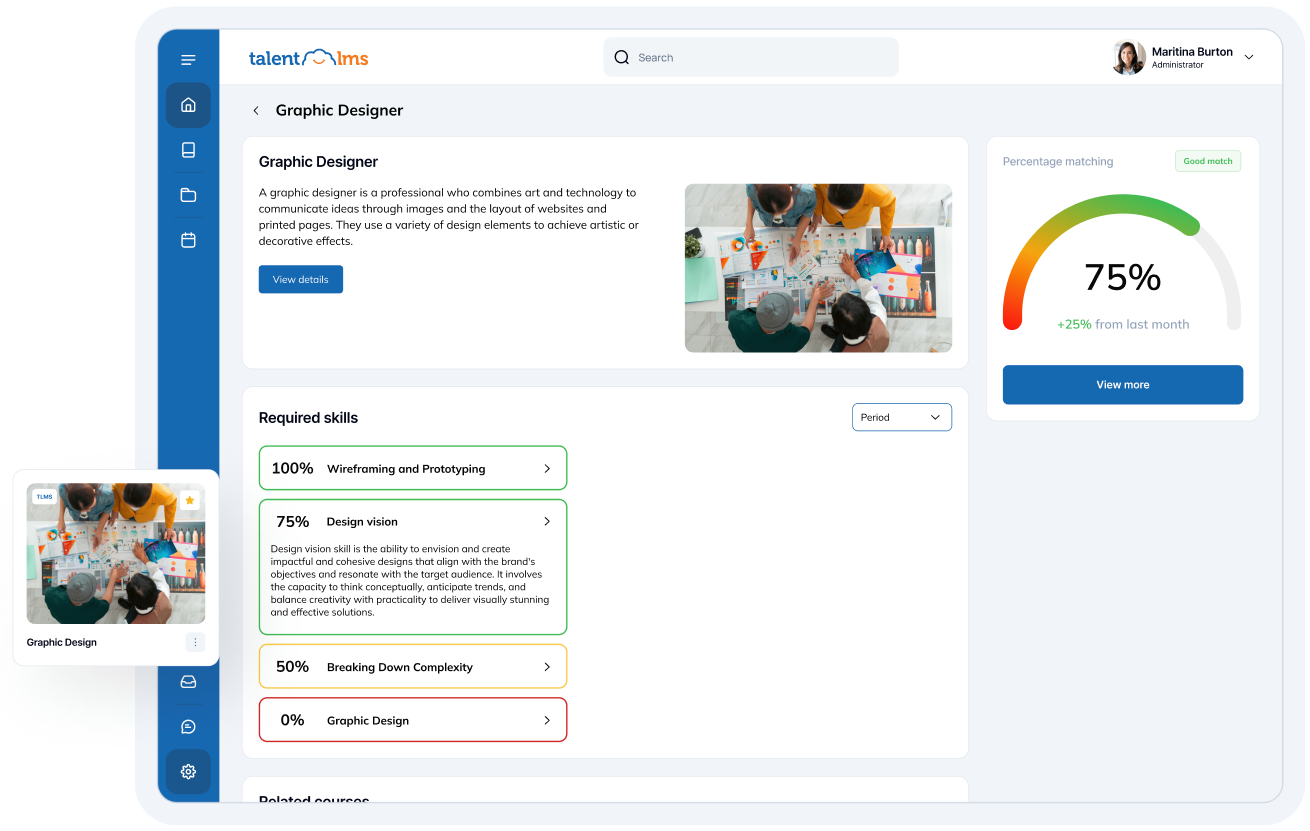
User-friendly interface
Your LMS should make learning easy—both for you and your customers. Look for a platform with an intuitive, clean interface that allows learners to dive in without needing a tutorial. Bonus points for features that streamline admin tasks. So you can spend more time focusing on your customer training strategy.
Seamless integrations
Your LMS shouldn’t exist in a silo. Make sure it integrates smoothly with your existing tools—like your CRM or helpdesk—so you can track customer progress and streamline your workflows without duplicate data entry.
Pre-built course libraries
Why start from scratch when you don’t have to? A great LMS should offer access to a library of professionally crafted, ready-to-use courses that help your customers learn faster and smarter. Look for course catalogs that cover a variety of topics—like compliance and productivity—to enrich your product education effortlessly.
Remember, pre-built courses don’t just save time. They also give your customer training programs an instant glow-up.
Meet TalentLibrary™
A growing collection of ready-made courses that cover the soft skills
your teams need for success at work![]()

Scalability and security
Whether you’re onboarding a small team or thousands of users, your LMS should grow with your business. Also, strong security features, like data encryption and role-based access, are non-negotiable to protect customer information.
Skyrocket your business with exceptional customer education
A strong customer education program does more than teach—it transforms. Equipping your customers with the tools they need to succeed fosters lasting partnerships, boosts customer retention, and turns loyal customers into brand champions.
So, whether you’re onboarding new users, delighting long-time clients, or empowering your support teams, remember this: customer education is an investment in growth, loyalty, and reputation. With the right strategy and tools, you can turn every interaction into a meaningful learning experience that leaves a lasting impact.
Let your education efforts set the stage for your organization’s next level of success!
Originally published on: 28 Mar 2018 | Tags: Corporate Training,customer training,Ongoing Training
